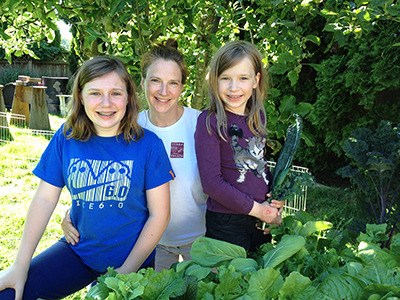Heres a story that could have turned Mary MacKay and John Jandera into those smug parents who take all the credit for their childs perfect behaviour.
One night they took their then three-year-old daughter Jessica to a sushi restaurant. Jessica loved the raw quail egg and especially delighted in the salmon eggs because of the way they popped in her mouth. How proud they were that they were raising an adventurous young eater!
Now heres a story that made them realize that they have little influence on their childrens willingness to eat anything other than cereal breakfast, noon and night. Their second daughter, Julia, whos now eight, is a notoriously picky eater. There are constant fights at the dinner table; I cant even get Julia to eat a green leaf without a big deal, MacKay says.
This past Fathers Day, they reached a milestone when Julia was willing to eat a hamburger. Until then, Julia refused to mix her foods together in anything resembling a sandwich. (This might not be devastating news to other parents; MacKay, however, is the head baker at Terra Breads.)
As one of the organizers of the June 30 Joy of Feeding event at UBC Farm, MacKay is a huge proponent of sharing food as a way of sharing love. There is joy in making homemade, nutritious meals that your entire family can share. But what if your child doesnt want to share along?
MacKay talked about this with Jessica, her adventurous eater, whos now 12. Jessica thinks that being willing to try new foods is a mix of something youre born with and the result of being exposed to different foods. But once you start school, its your peers who will have a more direct influence.
In school, you dont want to be different. If all your friends sandwiches are made with processed white bread, you dont want your mother to use her beloved sourdough bread, no matter how much you like it. Someone makes fun of the smell of your egg sandwhich? Youll come home and say you no longer like eggs.
Here are some of Mary MacKays tips for making sure that even the pickiest eaters are getting the nutrients and sustenance they need.
Dont try to fool your children by hiding things in the food. MacKay recently added some fresh chives to a tuna melt; Julia immediately sussed out the greenery and didnt want to eat it. For some children its the combining of foods. They want everything simplified and separated.
Give children some control over what they eat. MacKay doesnt put all the food on a plate and insist her daughters eat it. It didnt work for her as a child and it leads to tears at the dinner table. Instead, put all the foods on the table and let your children help themselves. The rule is, however, that they must try everything.
Barter with them. Julia loved to pick out the mushrooms at the grocery store and put them into the brown paper bag but then refused to eat them. Shes now allowed to put them in the bag if she tries some of the dishes that include mushrooms.
Bribe them. When Mary and John wanted their adventurous eater to try raw oysters, they negotiated back and forth until Jessica agreed that shed try one if her parents paid her $30. But be careful of what you wish for the other day, they sat down and devoured a plate of oysters. It was a very expensive lesson, MacKay laughs.
Make vegetables fun by growing them in your own garden.
Dont get emotional. Food wars usually take place at the end of a long day when everyones tired. No one wins when eating becomes a battle.
Always try something new. Julia, who only recently ate a lettuce leaf, loves Brussels sprouts and kale. Go figure.
Just keep trying. If you label them a picky eater, you stop making the effort.



